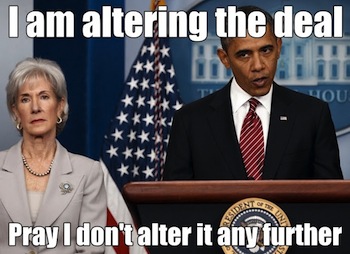
There’s been a lot of furor over the Obama administration’s implementation of universal health care, specifically the provision by Health and Human Services department regulation that every health insurance plan, without exemption for religious reasons, must include coverage for contraception for employees.
The Catholic Church (and I don’t mean just the bishops) has reacted very strongly against this intrusion on our religious liberty. Some have said that this is just the chickens coming home to roost; that it’s the result of years of backing down from conscience violating laws when the institution, but not individual Catholics, gets an exemption.
And then last week, Obama claimed to offer a compromise—one that didn’t include anyone but his own team in the “negotiations”—that wasn’t really a compromise at all. In fact, Nothing has changed:
But the rule HHS finalized on Friday actually put in place nothing like what the president announced. On the contrary, the final rule enacts the very same terms that HHS had announced on January 20th.
But I think there’s a wider issue here as well. Under the President’s plan, the health insurers for Catholic organizations would be required to provide contraception to employees at no cost. But not a word was said about government reimbursement. In fact, it looks to me that what the federal government has done has ordered an industry to provide a product at no cost, with no reimbursement.
What’s next? Doing away with food stamps and ordering grocery stores to provide food to the poor out of their own pocket? Telling local fuel oil providers to give heating oil to customers who can’t afford it? Free college educations for all?
This is essentially nationalization of industry. I’m no constitutional scholar, but it seems to me that this is unconstitutional. Why isn’t the insurance industry howling? Why haven’t they been fighting Obamacare tooth and nail? If this law was really going to reform healthcare in this country and make it less expensive, you’d expect they wouldn’t like that at all. Maybe they aren’t protesting because in the end they know that with the federal government being the bad guy—mandating premiums, limiting treatment options (except where it’s requiring them like this)—they’re going to end up with even fatter profits.
The HHS mandate is just the tip of the iceberg, but it’s not really news for any of us who objected to four years of extreme policies from this White House. While I have great hope that come November we’ll have a new president, I think this thinking goes beyond one president and even one party. I have a hard time imagining politicians mustering the will to walk back all the Obama-era excesses. If so, we are on a very bad path indeed.
